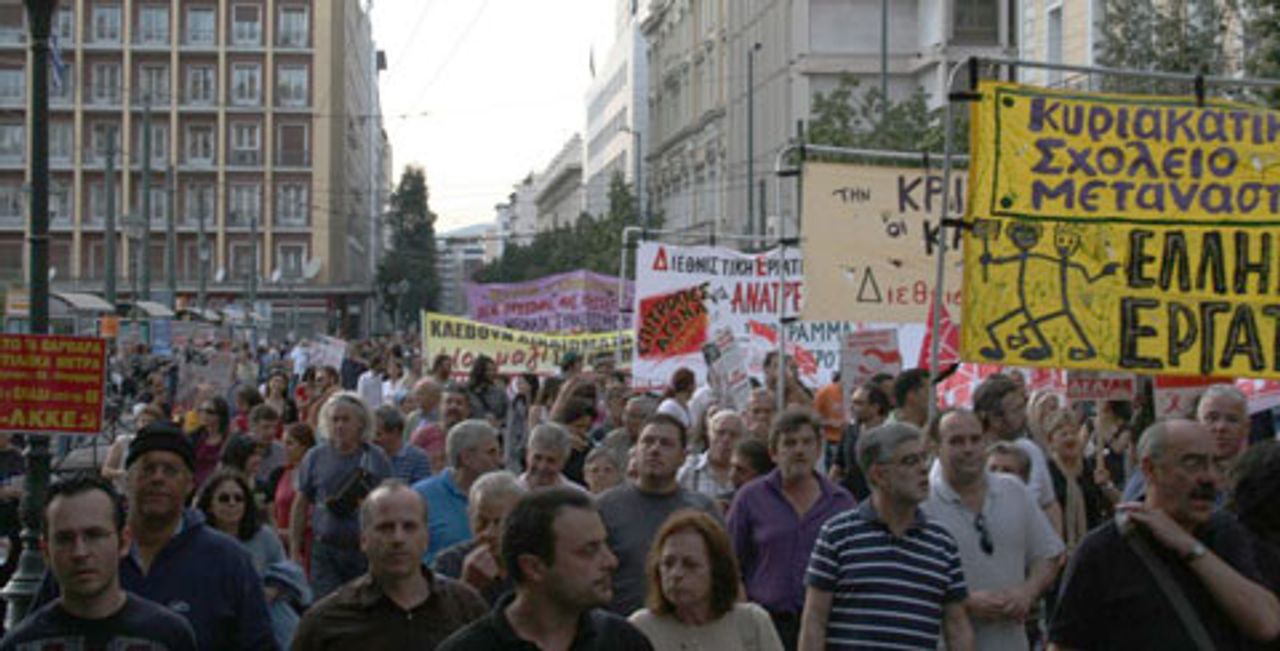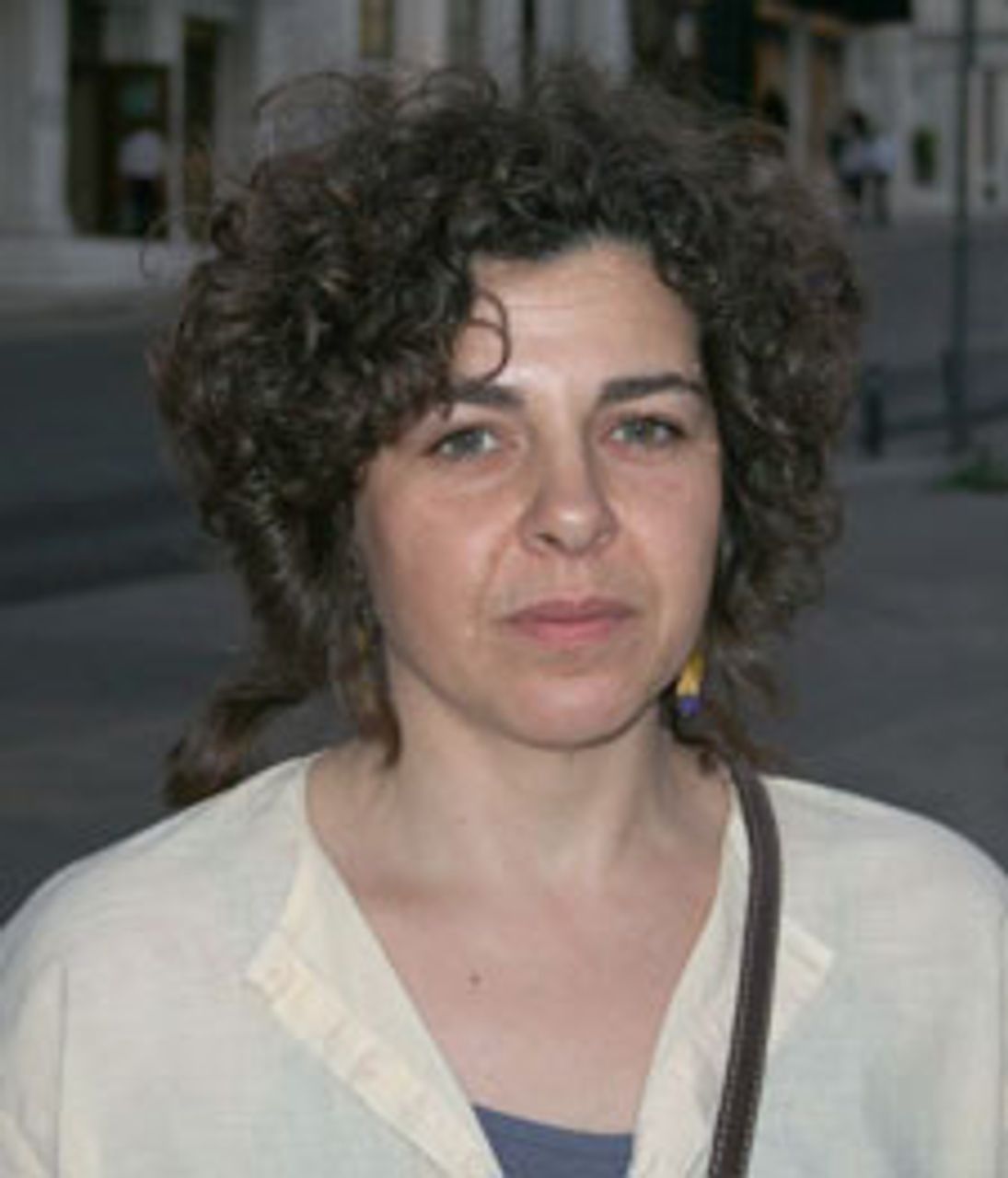Thousands of demonstrators marched Wednesday night in Athens against the austerity program of Greek Prime Minister Georgios Papandreou, who is slashing workers' living standards to pay the state's creditors among the major international banks.
 A section of the GSEE Adedy march on May 12
A section of the GSEE Adedy march on May 12The demonstration was called by the ADEDY public sector and GSEE private-sector unions, after Tuesday's announcement of a pension cut agreed by Papandreou with European and International Monetary Fund (IMF) officials. This was the latest in a series of cuts in pensions, wages, and jobs as Papandreou tries to squeeze €30 billion in cuts from a country of only 11 million people. Financial papers are suggesting that the proposed cuts would ultimately lead to a collapse of the Greek economy by 30 percent or more.
The rally began at the Klafthmonos Square before proceeding to the Greek Parliament building. It also passed by the site of the Marfin Egnatia bank, where three employees were tragically killed on May 5. The workers died following the firebombing of the branch by as yet unidentified, hooded attackers. As the march proceeded past the bank, many workers stopped to pay their respects. The entrance was covered in flowers, photos and messages, placed there in memory of the three deceased employees.
Though ADEDY and GSEE had called the protest, they did not organize any major contingents of strikers from factories or workplaces. The bulk of the marchers were contingents of trade unionists and students belonging to Greece's ex-left parties, such as Syriza (Coalition of the Radical Left) and Antarsya (Anticapitalist Left Cooperation for the Overthrow). Those workers and youth that did attend came largely on an individual basis.
The trade unions supported Papandreou's election campaign last autumn, and delayed calling any demonstrations against the austerity plans in December and during the first months of the year. When the unions have organised strikes, they have been sporadic one-day protests, which have been called with the aim of ensuring that the anger of the working class does not get out of control and escalate into a confrontation with the PASOK government.
The WSWS reporting team spoke to members of several of the ex-left parties who attended the demonstration. These parties are engaged in a betrayal of the working class, backing the government while claiming to oppose it. They insisted that whatever objections workers have to Papandreou while he carries out the cuts, the government must remain in power, and workers must limit themselves to asking Papandreou to carry out different policies.
Tharnassis Kourkoulas, a trade unionist and member of Syriza, said that the trade unions had begun calling more strikes because of rising anger in the working class: "There are thousands of angry people—the top people [at ADEDY and GSEE] have to organize strikes. There have been austerity measures for some months now. Previously, the trade unions were not so likely to call strikes."
He said that Syriza "does not call for the removal of Papandreou," though Papandreou "now seems far worse" than the previous conservative government of President Kostas Karamanlis. In fact, he said that attempts by sections of Syriza, such as the Renewal Wing, to negotiate a coalition with Papandreou's PASOK party were an "old story, not a new tendency."
Manifestly, a policy of negotiating with and supporting Papandreou did not bother Kourkoulas, despite Papandreou's policies. Even though Koukoulas had acknowledged that Syriza had a long policy of making advances to PASOK, he said that he wanted to "fight inside Syriza so that Syriza continues to be what it has been."
 Panayiota
PanayiotaWSWS reporters spoke to a number of workers who attended the demonstration including Panayiota. Panayiota works as a singer and takes other jobs, including as a jewelry designer. She is currently unemployed and said Papandreou's measures are "brutal, they're unfair, they come at the expense of ordinary people."
She explained: "As a musician, I'm in an insecure profession. I'm unemployed, my father is a pensioner. He gets €700 and a supplement. ... My income is €300 to €400 a month; I live with my parents and share food and utilities. The amount of food we keep in the fridge is gradually going down. The latest bill for utilities went up by €80; I think they were backdating a rate increase. ... My brother's in the public service; his pay has been cut roughly 30 percent, especially due to the cuts in bonuses, the loss of the 13th and 14th month payments."
Panayiota said that it was very difficult to understand what the government was doing from reports in the media: "One thing I want to say about the cuts is that we don't hear about the legislation, or what we hear about it is very hazy. We don't hear the truth, and the situation changes so fast anyway."
She added, "All the governments have been robbing us, and now we have international problems because of the IMF. We don't know who we should turn to. All these demonstrations—they have some meaning, but mainly it's old party politics. There should be wider civil disobedience; we should not pay if electric bills or utilities go up."
Asked what she thought of Greece's political parties, she said: "I did not want to abstain from voting, so I voted for Syriza, but I don't feel it represents me. [Inside Syriza] there are so many tendencies, they can never say anything concrete. There is a lot of factional infighting."
When the WSWS team explained that representatives of Syriza had told them that they did not agree with calling for the bringing down of the Papandreou government and its replacement with a workers' government, she replied that she found their attitude to be "very strange".
WSWS reporters also spoke to Costas, an auto parts worker. He said: "I've been working since 1968; now I make car brakes. I'm 59 years old. Now I'm only working three days a week, even though I've had the same job for 29 years."
He continued: "I was getting [a monthly salary of] €1000, now I'm down to €600. Wages were cut one week ago, overnight. For everyone my age at the factory it's the same. With globalization, everything was commercialized; we don't make goods, we simply import them. It's becoming an import-export business."
Asked what impact the wage and pension cuts would have on him, he said: "Of course it will be hard, I have a wife and two children. I have to pay everything. The children are 18 and 10; they're just starting. If I retire before 2011, my retirement could be OK, but if I work beyond that, I'll be in trouble."
Asked for his opinion of Papandreou, he said: "We want him out, of course—he cheated us." Asked about his trade union, he said: "They're cheating us, too." He said the situation in Greece today was "the worst in forty years. They've completely cheated us."
WSWS reporters noted that he was saying the conditions in Greece were worse than under the military junta that ruled Greece in 1967-1974. Costas said, "I was against the junta. I wanted to work in the merchant navy, but my father was a leftist and so I couldn't get papers."
Asked what he thought the fall of the junta meant, he said: "It meant freedom, but freedom did not come. The same thing happened again: one group of people went, and another came in. What sort of freedom is this?" Gesturing to the demonstration, he said: "This is the proof. We all pay [pension] contributions, they steal our money, and then they tell us to pay. What is happening now is the same as the coup, but with different clothes."
